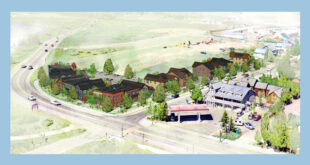Yerman advocates for InDeed program
By Mark Reaman
Outgoing Crested Butte community development director Michael Yerman presented his final ”Five Year Affordable Housing Plan” to the Town Council on January 21 and said there were three primary avenues worth pursuing in earnest.
“I would say the town has done an amazing job of looking at everything possible over the last several years and had good success,” Yerman told the council. “When talking to people around the state, they see one of our biggest successes with our zoning that encourages workforce housing in the commercial zone. We have built 65 deed-restricted units in town since 2016 and 47 are scheduled to be completed in 2020, including 21 rentals.”
For the future he advocated most strongly for the town to focus on a so-called “Green InDeed” program that would pay homeowners to put a relatively loose deed restriction on their homes. He also laid out the case for the council to try to find a regular funding source for housing that could bring in $255,000 annually to comfortably pay for future housing projects.
Yerman said there were three primary projects on the horizon that had different ramifications for budget and timelines. The InDeed program, the Slate River annexation and Phase 3 of Paradise Park topped his list.
The Green InDeed program was one that Yerman felt could be implemented quickly and over time would make a big difference in town. Basically the town would pay a homeowner 10 percent to 15 percent of the appraised values of the unit and in exchange the owner would agree to a deed restriction that called for the unit being either owner-occupied or long-term rented. There would be no income restrictions or work requirements involved. Yerman made it clear that every additional requirement imposed on a house would mean the cost of the deed restriction would be more expensive.
“If the town can do three of these a year it would add up significantly over time and keep people living in town,” he explained. “The time to do it is when a house is worth $1.2 million and not $4.2 million.”
Yerman suggested that the town could sell one of its affordable lots in Paradise Park with a similar deed restriction to what would be imposed in the InDeed program. He guessed that it could bring in $450,000 to $600,000 and that could be the seed money for the deed restriction purchase program. Lot 5 on Block 80 has some soil issues that he said the town would rather not deal with but could make for a sweet lot for a local with some money.
The Slate River Annexation project would be the biggest and most expensive of the potential projects. Using 60 units as an example of what could be built on the property, Yerman said such a project would cost between $14 million and $18 million and be “a very big project for the valley.”
He said that site would include some extra expenses such as cleaning up the old landfill buried on a portion of the affordable housing parcel. He foresaw it taking four years from start to finish, with lots of public outreach and a private-public partnership needed to make it feasible.
The third phase of the Paradise Park subdivision would ultimately result in between nine and 12 deed-restricted units between three duplex lots and two triplex lots, one of which is owned by the county. Yerman said the template, like one used with John Stock’s High Mountain Concepts where the town retains ownership of the land and Stock builds the units would work best. The units would then be sold or rented and could go to local businesses or local families.
“The Slate River annexation project is pricey,” Yerman said. “The InDeed program chips away at the problem and makes a big dent over time. It could help existing locals stay in town and I’ve had people approach me with interest in participating. It isn’t necessarily for workforce housing like the pizza maker but it would add to locals living year-round in town.”
Mayor Jim Schmidt expressed some concern about what qualifications would be associated with the deed restrictions purchased by the town. He mentioned the idea of rent control and tying workers to living in the property. He wondered if that would be the best use of housing money compared to building workforce housing units.
“Remember that the town is about 90 percent built out already,” said Yerman. “The more restrictions you put on, the more expensive it will be to buy the deed restrictions. This probably lets you deed-restrict three units for the price it costs to build one from the ground up.”
“It’s part of the affordable housing toolbox,” said councilman Will Dujardin.
Yerman noted the affordable housing toolbox isn’t filled with cheap tools. “If you can generate an extra $250,000 per year it would really help allow these projects over the next five years and well into the future. Otherwise, the projects will be competing against other capital needs within the town. That will bring up some tough budget decisions and could impact other priorities like the Climate Action Plan or upgrading of the skate park. Asking voters for $250,000 seems a reasonable ask of the citizens.”
Without going into any specific proposal, Yerman said an excise tax, an increase in sales tax or a mill levy increase could be the way to generate the needed funds.
The council is actively considering a vacant home tax but was open to looking at all alternatives for funding.
 The Crested Butte News Serving the Gunnison Valley since 1999
The Crested Butte News Serving the Gunnison Valley since 1999


